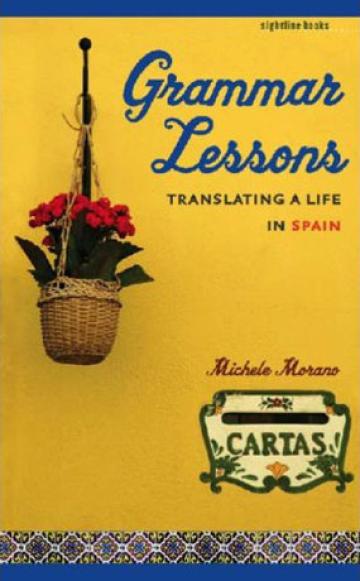Michele Morano's GRAMMAR LESSONS
University of Iowa Press, March 2007
184 pages, $22.50
Grammar Lessons, by Michele Morano, is a thought-provoking collection of thirteen personal essays grouped by her three stages of experiences with Spanish language and culture. Oviedo, the first stage, details Morano's stay in Spain as a young woman, teaching English and studying Spanish with other international students. The second stage, Madrid, Altamira, Guernica, explores Morano's reflections as a forty-something woman, in her subsequent trips to Spain. Part three, After Spain, is a curious trek back to her twenties, immediately after her return from traveling abroad. The last essay, seen through her eyes now, attempts to sum up her experiences into one cogent theory on how language shapes perception.
Early on, Morano establishes the travelogue theme as she explores Spain and its language. Grammar animates words, and is powerfully tied to the way we think, feel, and express ourselves. Learning a different language forces us to shift and explore the ways we perceive. For example, Morano explains, while in English, we "drop" something, in Spanish, something is either "thrown" or "falls." While in English we blame ourselves for dropping things, in Spanish, one either purposefully throws an object, or the object leaves of its own volition, eliminating our agency, and rendering blame impossible.
In the essay, "In the Subjunctive Mood" this grammatical connection is most palpable. The subjunctive is a grammatical oddity-it is not a tense, but a mood used to express how true one feels a situation to be. In explaining how the subjunctive works, Morano delivers powerful examples from her own life, like leaving behind a suicidal codependent lover in America for her guiltily won freedom in Oveido. And how their bittersweet reunion in Madrid, parting with promises of a happy future together, prompts her to think of the Spanish subjunctive, Ojalá, "if Allah is willing, let it be so." It's a dangling wish: "optimism with resignation, hope with heartache." Morano not only succeeds at explaining a complex grammatical concept, but also tells a compelling story.
There is a shift in Part Two, which emphasizes words and memory over grammar. In "Authenticity and Artifice" Morano compares her two visits to Altamira, a Paleolithic cave with vibrant wall paintings of bison, horses, and boar. In the years between her visits, Altamira was shut off to visitors because of its fragility. In its stead is a replica cave, replete with paintings, but without the internal concrete supports that were added to buttress the crumbling original . The essay explores the irony of authenticity-the thrill of having seen the original, even if the impeded view was inferior to that of the replica-and the quiet schadenfreude, knowing that others will not have the authentic experience that you have had.
The first essays of Grammar Lessons are filled with youthful vibrancy and an international spirit which at times borders on naiveté. Some essays work better than others-some are so self-conscious they seem solipsistic. As a whole, though, Grammar Lessons flowed nicely, without the overwrought narcissism that travelogues often have. Morano powerfully uses her personal stories to illustrate the principles of grammar-or is it the other way around? The principles of grammar exist to shed light on her highly personal narrative. Perhaps that is why this nonfiction book is so engaging.
 Michele Morano holds a PhD in English and an MFA in nonfiction writing from the University of Iowa. Her work has appeared in the Georgia Review, the Missouri Review, Fourth Genre, Under the Sun, and The Crab Orchard Review, as well as in literary anthologies. Honors for her writing include a Rona Jaffe Foundation Writers Award, the John Guyon Prize for Literary Nonfiction from The Crab Orchard Review, a prose fellowship from the Illinois Arts Council, and special mention in Best American Essays 2004.
Michele Morano holds a PhD in English and an MFA in nonfiction writing from the University of Iowa. Her work has appeared in the Georgia Review, the Missouri Review, Fourth Genre, Under the Sun, and The Crab Orchard Review, as well as in literary anthologies. Honors for her writing include a Rona Jaffe Foundation Writers Award, the John Guyon Prize for Literary Nonfiction from The Crab Orchard Review, a prose fellowship from the Illinois Arts Council, and special mention in Best American Essays 2004.
 Elizabeth Cho received her BA in business and MA in art & archaeology from Brown University. An ad executive by day, art consultant by night, she brings together her starving artist friends with her yuppie friends in a modern day salon way. She assists young artists in the beginning of their careers while helping young collectors develop individual tastes in art. Her other great love in life is writing. Her short stories have been published on 5_trope and other literary magazines. Please visit her website Au Currant where she discusses what is au courant in art, culture, and literature. To contact Elizabeth e-mail:echo@kgbbar.com.
Elizabeth Cho received her BA in business and MA in art & archaeology from Brown University. An ad executive by day, art consultant by night, she brings together her starving artist friends with her yuppie friends in a modern day salon way. She assists young artists in the beginning of their careers while helping young collectors develop individual tastes in art. Her other great love in life is writing. Her short stories have been published on 5_trope and other literary magazines. Please visit her website Au Currant where she discusses what is au courant in art, culture, and literature. To contact Elizabeth e-mail:echo@kgbbar.com.
